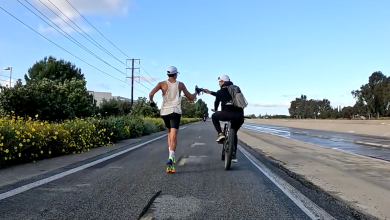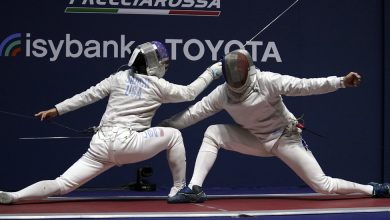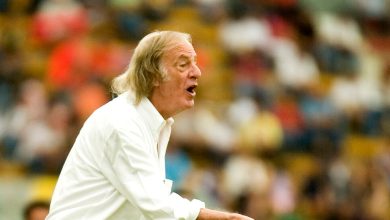Chris Eubanks Arrives on the Grandest Stage in Tennis

Something strange started happening to Chris Eubanks earlier this year.
As he walked the grounds of the Miami Open, people kept stopping him, asking for selfies and autographs. He took time during an off day to visit a sponsor’s suite and glad hand some executives and their guests.
It’s not the sort of thing that a player in his position — a month away from his 27th birthday, having drawn little attention during his first five seasons in professional tennis — generally experiences. But just days before, a video of Eubanks choking back tears after being told that he had finally broken into the top 100 after an early round win had gone viral in the tennis world. Now he was into the Miami quarterfinals, and seemingly everyone wanted a piece of him.
“Definitely didn’t foresee this,” he said at the time, as he walked through the bowels of Hard Rock Stadium, his eyes glazed from all the attention.
Four months later, Eubanks is getting used to it in a hurry.
A day after beating Cameron Norrie, the top British player, in front of a packed crowd on the No. 1 court, Eubanks was at it again on Saturday, knocking out Chris O’Connell of Australia in a throwback-style Wimbledon match filled with big serves, short rallies and three tiebreak sets that all went Eubanks’s way.
On Friday, the thrill came from overcoming a Wimbledon semifinalist and Norrie’s hometown crowd. During the warm-up on Saturday, Eubanks looked up at the stands and suddenly realized he was playing on the court where the 11-hour-five-minute match played by John Isner and Nicolas Mahut over three days in 2010 ended at 70-68 in the fifth set.
“That was kind of cool,” said Eubanks, who allowed himself a moment to take it all in. Then he turned his mind to nailing serves, playing aggressively and ending points whenever the chance arose. “I’ve done a pretty good job of focusing in on each match individually and not really focusing on the magnitude of what’s going on.”
And 23 aces later, Eubanks had a round-of-16 date set for Monday with Stefanos Tsitsipas, the world’s fifth-ranked player.
“The whole match was on his racket and I couldn’t do anything,” a dazed O’Connell said of Eubanks when it was over. O’Connell had played Eubanks once before, at a tournament in the tennis minor leagues in South Korea last year. His opponent on Saturday was nothing like the error-prone player he faced a year ago.
“He didn’t miss,” O’Connell said. “He’s riding on confidence and he’s playing some unbelievable tennis.”
Eubanks’s Journey Stands Out
It can happen at Grand Slams. A journeyman catches fire and plays himself into the deep end of the tournament, just months after toiling in the minor leagues. Even by those standards, Eubanks’s journey stands out, both in its unlikelihood and, now that it has happened, in the reason it did.
Go back to his teenage years, growing up in Georgia in the early 2010s. His tennis-loving father was a baptist minister, so his mother had to accompany him to most of his Sunday matches. Back then, Eubanks didn’t rate high enough with the United States Tennis Association to merit much in the way of support. That would come after college, when he received a $100,000 grant from the U.S.T.A. to help fund his pro career.
The Covid-19 pandemic arrived as Eubanks felt he was beginning to figure out his game. He had qualified for the Australian Open and picked up some wins on the second-tier Challenger Tour to gain some confidence. When the tour resumed after the pandemic disruption, he felt he had to start all over.
Eubanks and his agent had a heart-to-heart.
“I said, ‘Listen, if I’m still 200 by next year and injuries haven’t played a part, I can do something else with my time,’” Eubanks recalled after his win over Norrie. “It’s not that glamorous if you’re ranked around 200.”
That’s how Eubanks, who studied business at the Georgia Institute of Technology after starting out as an engineering major, ended up making occasional appearances in the Tennis Channel commentary booth, something he believes has helped him better analyze his own matches while he is playing them.
‘Doing All the Little Things’
Last year, Eubanks, who is 6-foot-7 and whose powerful style is described by opponents as a “big game,” decided to make some changes. After years of cutting corners and trying to build a tennis career on the cheap, he committed to a consistent routine, and he spent money on a full-time coach.
Every practice and gym session had a plan, and mostly happened on a schedule. He started to focus on his rest and was more careful about what he ate. Even if his body felt fine after a training session or a match, he let a physiotherapist work on him.
“Just making sure I was doing all the little things,” he said.
The wins, sometimes four or five a week at small tournaments, started to come.
Martin Blackman, the general manager for player development at the U.S.T.A., said following that routine was at once the easiest and the hardest thing for a player to learn. Anyone can focus for a week or a month, but not seeing quick results can make a player question whether diligence makes any difference.
Blackman, who has known Eubanks since he was a teenager, said his upside was plainly apparent given his physical attributes and talent.
“That he has been able to rise up this quickly is a surprise,” Blackman said.
Eubanks had to win two qualifying rounds just to get into the Miami Open in March. Making the quarterfinals, on the hard courts that American players are raised on, is one thing. Making the round of 16 at Wimbledon, where he has never played in the main draw and where he was so unfamiliar with the grounds he had to ask where he could find the practice courts when he arrived a week ago, is quite another.
After Miami, with a ranking that would get him into the biggest tournaments and provide some financial security, Eubanks returned to the minor leagues to see if he could translate those solid few months into the life of a consistent professional. He played a series of hardcourt events in South Korea, where he continued to pick up wins and rankings points. Then he headed to Europe for a hard week of training and a clay court tuneup for the French Open, where the slow surface did not play to his strengths and he lost in the first round. Then it was off to play on grass.
He hated it. A month ago, Eubanks was telling his friend Kim Clijsters, a former world No. 1, that it was a “stupid” playing surface.
She told him that someone who can serve like he can should not fret. Bend your knees and focus on the movement. Stop planting your foot to change direction and take a few extra small steps so you’re not slipping everywhere. His coach had given him similar advice. Hearing it from Clijsters felt different.
Week by week, Eubanks said, he became more comfortable and confident, especially after he captured the ATP Tour title at the grass court tournament in Majorca, Spain, the week before Wimbledon. The next day he was asking for directions to the practice courts at the All England Club.
“I think it’s slowly, slowly growing on me,” Eubanks said with a grin after his win over O’Connell. “At this point I think borderline I might say it’s my favorite surface.”




